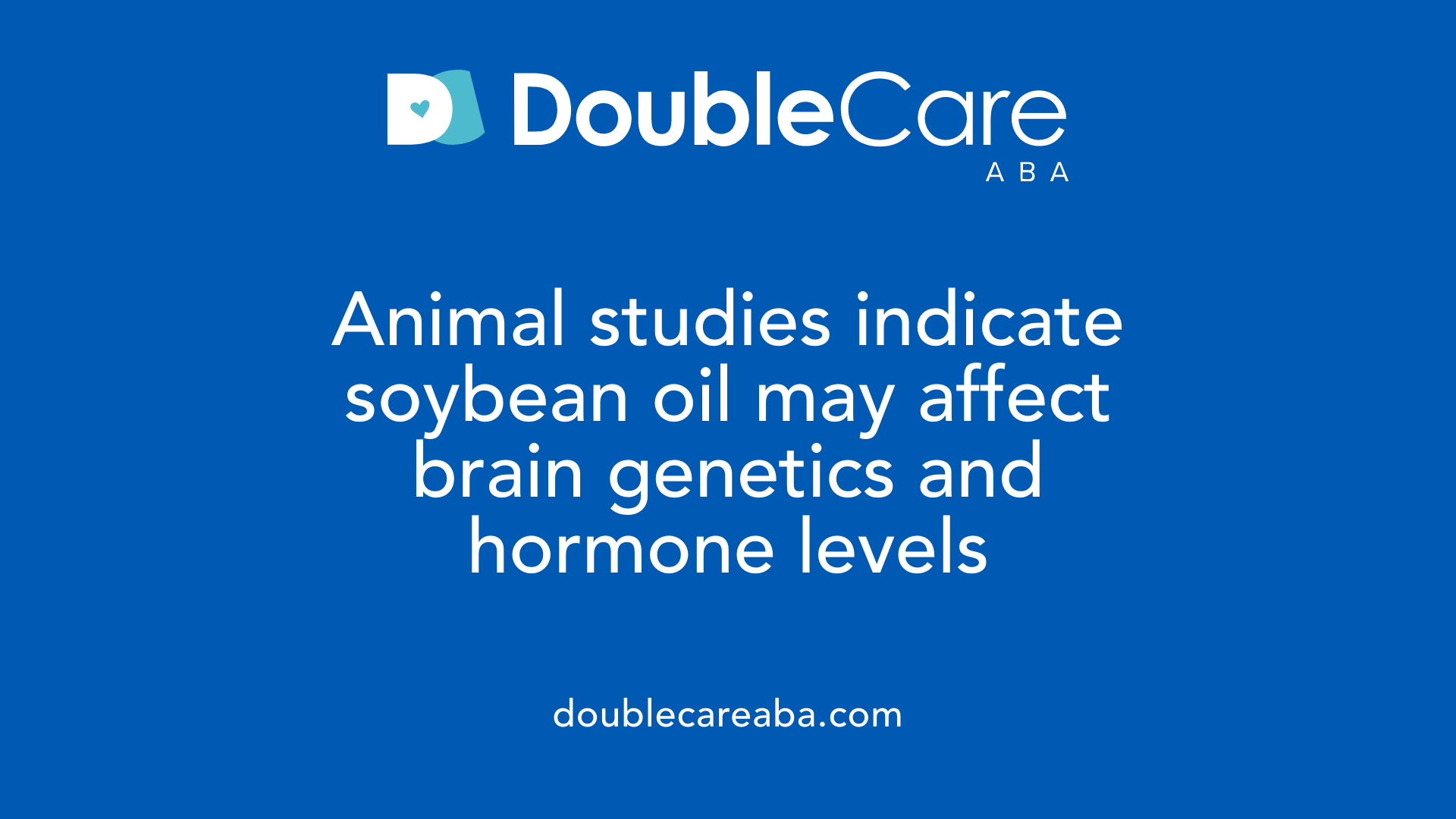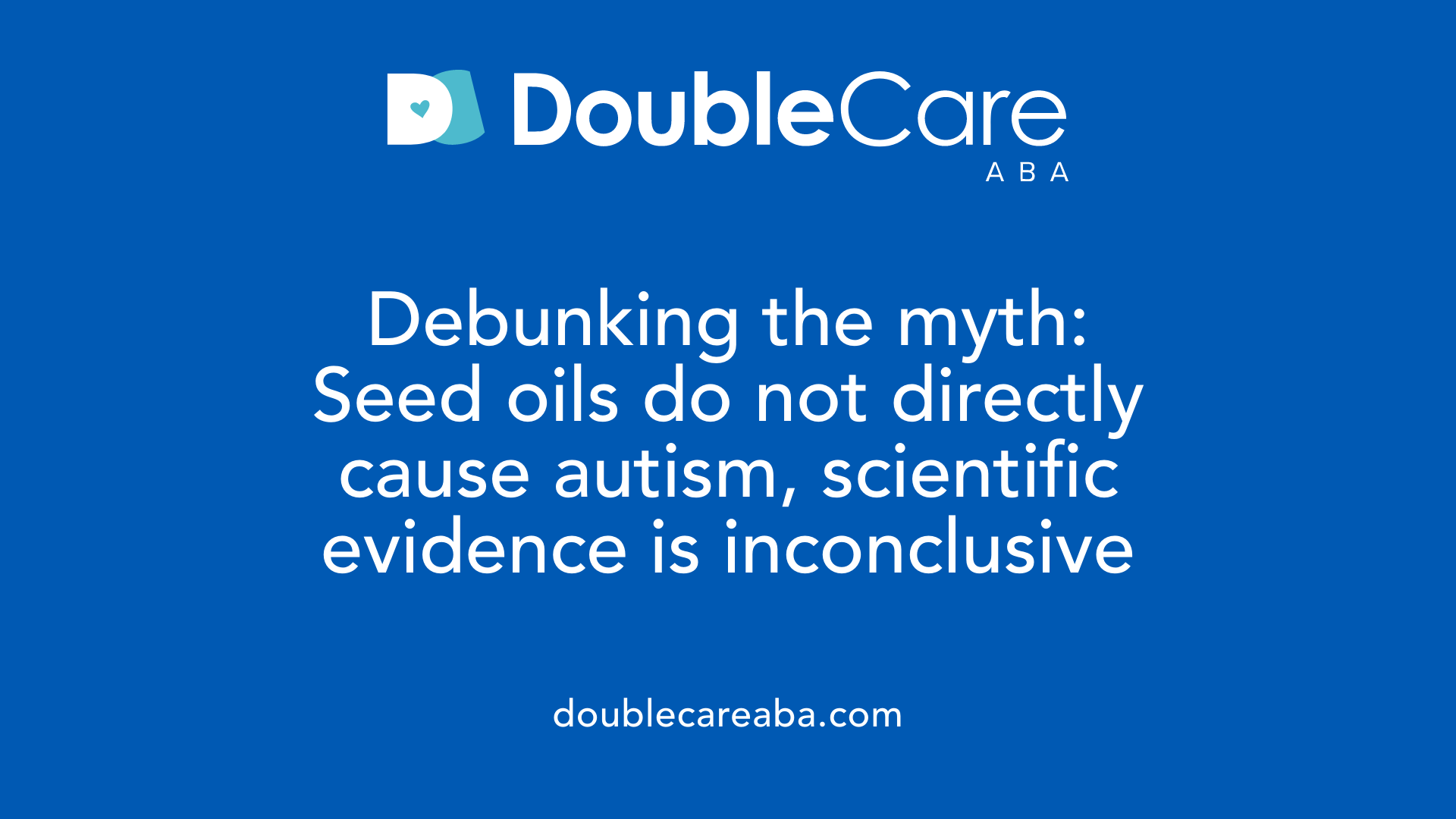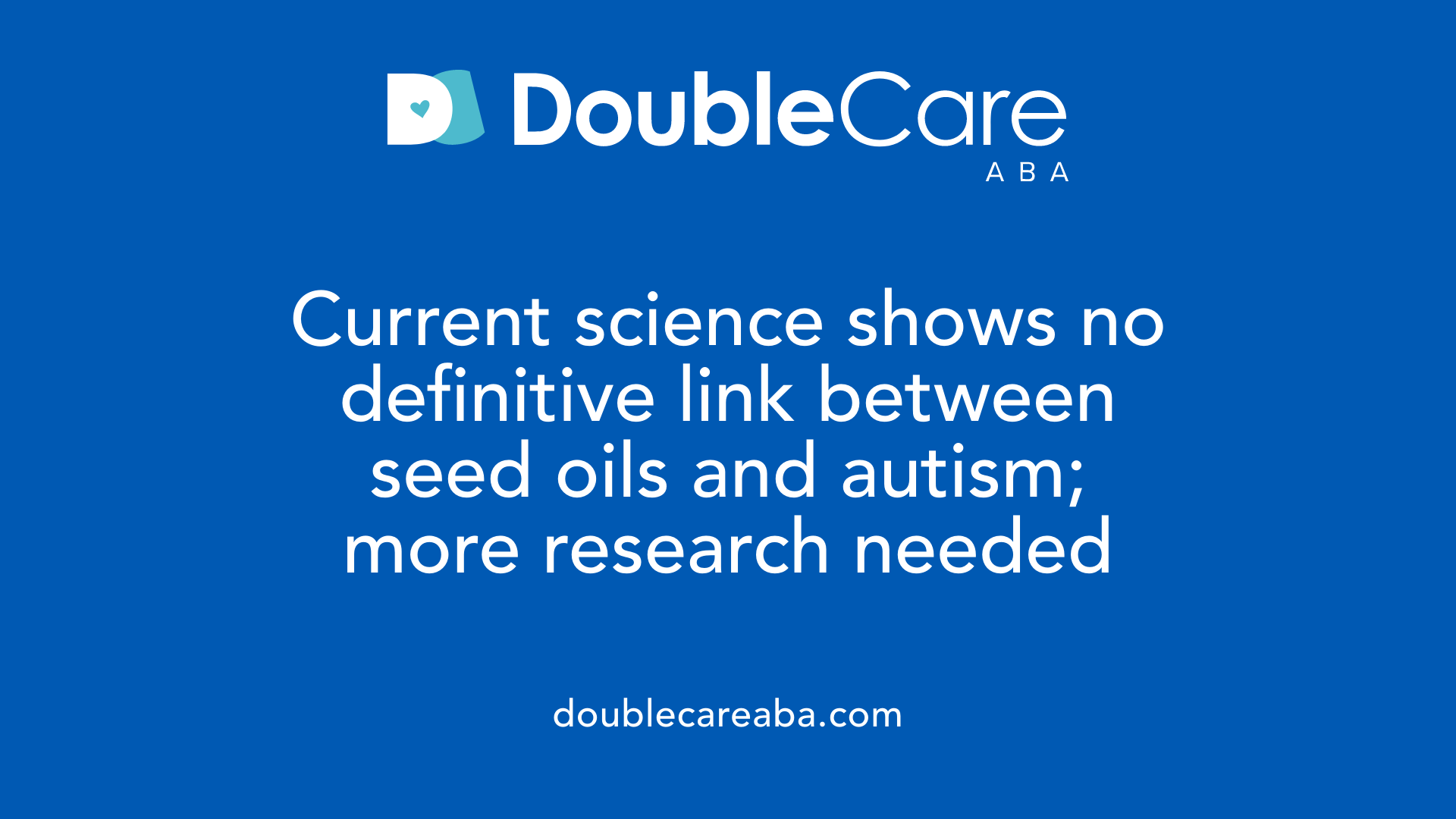Understanding the Scientific Evidence Behind Seed Oils and Autism
The link between diet and neurodevelopmental disorders such as autism spectrum disorder (ASD) has long been a topic of public interest and scientific investigation. With the proliferation of processed foods containing seed oils like soybean, sunflower, and canola oil, questions arise about whether these fats influence the development of autism. This article examines the current scientific landscape, exploring animal studies, epidemiological findings, biochemical mechanisms, and misconceptions to assess whether seed oils could be a contributing factor to autism spectrum disorder.
Animal Studies Suggest Potential Neurological Impacts of Soybean Oil
 Recent research from UC Riverside reveals that soybean oil may cause genetic alterations in the brains of mice, particularly impacting the hypothalamus, a region vital for hormone regulation and social behavior.
Recent research from UC Riverside reveals that soybean oil may cause genetic alterations in the brains of mice, particularly impacting the hypothalamus, a region vital for hormone regulation and social behavior.
The study found that mice fed soybean oil exhibited decreased levels of oxytocin in the hypothalamus. Oxytocin is a neurotransmitter associated with social bonding, emotional regulation, and reproductive behaviors.
Further analysis suggests that soybean oil influences nearly 100 genes related to brain function and energy metabolism in these animals. This indicates a significant potential for dietary fats to impact neurodevelopment at the genetic level.
However, current scientific findings do not definitively establish that soybean oil causes conditions such as autism in humans. The research was conducted exclusively on male mice, and its effects on females remain unstudied.
It’s important to note that these findings are specific to soybean oil; other soy-based products or vegetable oils were not examined in this study. Researchers also have yet to identify which specific chemicals in soybean oil might be responsible for these genetic changes.
While animal studies like these raise concerns about the neurological impacts of seed oils, more research is necessary to determine whether such effects occur in humans. The potential influence of dietary fats on brain development highlights the importance of cautious dietary choices and further scientific exploration.
Scientific Findings on Fatty Acids and Neurodevelopment

What do scientific studies say about the connection between seed oils and neurodevelopmental conditions like autism?
Recent research continues to explore how different fats impact brain development, especially during fetal stages. A study from UC Riverside highlighted that soybean oil, a common component in many processed foods, can cause genetic changes in the brains of mice. Notably, the study observed a decrease in oxytocin levels in the hypothalamus, along with alterations in nearly 100 genes related to brain function and energy metabolism.
However, it is important to clarify that there is no proof linking soybean oil directly to autism or other neurodevelopmental conditions in humans. The research was conducted solely on male mice, and potential effects on females remain unexamined. Moreover, the study focused specifically on soybean oil, without including other soy products or vegetable oils, which are commonly consumed in human diets.
Complementing this, research from Japan found a significant association between certain fatty acids present in umbilical cord blood and autism spectrum disorder (ASD) symptoms. Specifically, the compound diHETrE was linked to more severe autism traits and impaired adaptive behaviors, suggesting that fatty acids during fetal development may influence autism risk.
Additionally, a study on pregnant women showed that consuming healthy fats—particularly linoleic acid (an omega-6 fatty acid found in vegetable oils, nuts, and seeds)—was associated with a 34% lower likelihood of their children developing autism. Conversely, very low intake of omega-3 fatty acids, such as those found in fish, was linked to more than double the risk of autism.
While these findings highlight a potential connection between maternal diet, fatty acids, and neurodevelopmental outcomes, it is crucial to emphasize that current evidence does not establish cause-and-effect relationships. More extensive research is needed to confirm these associations and to understand the biological mechanisms involved.
In summary, scientific studies indicate that the type and balance of fatty acids—such as omega-6 and omega-3—may influence brain development and autism risk. However, the evidence regarding seed oils like soybean oil's role in causing neurodevelopmental conditions remains inconclusive. Moderation and focus on overall diet quality remain advisable for pregnant women and the general population.
Myth Busting: Misconceptions About Seed Oils and Autism

Are there any misconceptions about seed oils causing autism?
There is a widespread misconception that seed oils directly cause autism. However, current scientific evidence does not support this idea. Studies indicate that while certain compounds in soybean oil may induce genetic changes in the brain of mice—particularly affecting genes related to brain function and energy metabolism—these findings are preliminary and based on animal models.
Research involving mice has shown that feeding soybean oil can decrease levels of oxytocin in the hypothalamus, a brain region involved in social behaviors. Although interesting, these findings do not establish a direct cause-and-effect link to autism in humans. Moreover, the study on mice was conducted only on males and did not explore long-term health impacts or effects on females.
Contrasting animal findings, a large body of human research indicates that maternal dietary fats, especially healthy fats like omega-6 fatty acids from vegetable oils, nuts, and seeds, are associated with a reduced risk of autism spectrum disorder (ASD). For example, some studies found that women who consume higher levels of linoleic acid have a lower chance of having a child with autism. Conversely, very low intake of omega-3 fatty acids, found in fish, may increase autism risk.
It is crucial to clarify that these observational findings do not prove that seed oils cause or prevent autism. Instead, they highlight potential links between maternal nutrition and child development, emphasizing the need for further research.
Apart from diet, other environmental concerns—such as heavy metal exposure—are more convincingly associated with neurodevelopmental issues. Heavy metals found in some food supplies or environmental sources might influence autism risk, but these are not directly related to seed oil consumption.
Overall, the claim that seed oils cause autism is a misconception. While research continues to explore how diet affects brain development, current science does not support the idea that seed oils are a direct cause of autism.
The Role of Fatty Acids in Brain Health and Autism

What is the role of fatty acids, such as omega-6, in brain health and autism?
Fatty acids like omega-6 and omega-3 are crucial for brain development and proper functioning. They are primary building blocks of neuronal cell membranes and influence how neurons communicate through neurotransmitters.
Omega-6 fatty acids, particularly linoleic acid, are common in vegetable oils, nuts, and seeds. They support normal growth and cognitive development. However, an excess of omega-6 compared to omega-3 can lead to increased neuroinflammation, oxidative stress, and disruptions in neurodevelopmental processes.
Research indicates that children with autism spectrum disorder (ASD) often have abnormal polyunsaturated fatty acid (PUFA) metabolism. This imbalance may trigger the production of inflammatory cytokines and alter neurotransmitter activity, which can affect behavior, social interaction, and cognition.
Imbalance and neuroinflammation
An excess of omega-6 fatty acids relative to omega-3s may promote neuroinflammation, a condition linked to developmental and neurodegenerative disorders including ASD. Studies suggest that genetics and maternal nutrition influence fatty acid levels during fetal development.
Maternal diet and fetal brain development
Maternal intake of fatty acids during pregnancy significantly impacts fetal brain growth. Higher consumption of omega-6 fatty acids has been associated with reduced autism risk, while very low omega-3 intake may increase the likelihood of ASD. For example, women consuming more linoleic acid during pregnancy had children with a 34% lower risk of autism.
Conversely, insufficient omega-3s, primarily found in fish, can be linked to poorer neurodevelopmental outcomes. The delicate balance between these fatty acids during fetal periods appears vital for healthy brain development.
| Nutrient | Source | Impact on Autism Risk | Notes |
|---|---|---|---|
| Linoleic acid (omega-6) | Vegetable oils, nuts, seeds | Reduced risk | Higher intake associated with lower autism likelihood |
| Omega-3 fatty acids | Fish, seafood | Potential protective effect | Low levels linked to increased risk |
| diHETrE | Umbilical cord blood | Possible influence on ASD severity | Further research needed |
Research continues to explore exactly how these fats impact neurodevelopment, but current findings support the importance of balanced fatty acid intake during pregnancy for optimal brain health and possibly reducing autism risk.
Health Implications and Dietary Considerations
What are the health implications of consuming seed oils in relation to neurological development?
Recent scientific studies suggest that the widespread use of seed oils like soybean, sunflower, and canola may have complex effects on brain health. These oils are rich in omega-6 polyunsaturated fatty acids, which play important roles in the body but can also influence gene expression impacting brain functions.
In research involving mice, soybean oil consumption was linked to genetic changes in the hypothalamus, a brain region vital for regulating social behaviors, metabolism, and stress. Specifically, the study found a decrease in oxytocin levels—a hormone involved in social bonding—and alterations in nearly 100 genes related to brain activity and energy use. While these findings are preliminary and based on animal models, they raise questions about how high intake of seed oils might affect neurological development.
On the other hand, some oils such as extra virgin olive oil and coconut oil carry compounds that seem to support brain health by reducing inflammation and providing antioxidant benefits. These alternatives could be more beneficial in promoting optimal neurological functioning.
It’s important to note that researchers have not yet established a direct cause-effect relationship between seed oil consumption and neurological diseases like autism or Alzheimer’s in humans. The current evidence highlights a need for cautious dietary choices, emphasizing varied diets that include less processed foods and more whole, unrefined natural fats.
Ultimately, balancing oil intake, focusing on variety, and choosing nutritious fats are essential steps in supporting brain health. While seed oils are common and often embedded in many processed foods, moderation and mindful eating remain crucial for overall wellness.
Current Scientific Consensus and Future Directions

Is there a scientific consensus on the impact of seed oils on autism risk?
Right now, there is no clear agreement among scientists regarding whether seed oils, such as soybean oil, influence the risk of autism. The recent study from UC Riverside found that soybean oil can cause genetic changes in the brains of mice, especially in regions like the hypothalamus, which is involved in hormone regulation and energy balance.
However, these findings are preliminary and were conducted solely on male mice. Scientists emphasize that there is no direct evidence linking soybean oil or other seed oils to autism in humans. Similar research comparing fatty acids in human cord blood has found some associations between certain compounds and autism spectrum disorder (ASD) symptoms, but these results do not prove cause-and-effect.
While some parents and health practitioners consider dietary modifications, including reducing or controlling seed oil intake, as part of autism management, current evidence does not support the idea that seed oils directly cause or prevent autism. Experts stress that more detailed, human-focused studies are necessary to draw firm conclusions.
Need for more targeted research
The existing studies highlight areas for future exploration. For example, identifying which specific chemicals in soybean oil may cause genetic or neurological changes is essential. Additionally, research needs to expand to include female subjects and a broader range of oils and processed foods.
Furthermore, understanding how maternal fatty acid intake during pregnancy influences fetal brain development is crucial. Studies from Japan suggest certain fatty acids during fetal development might impact autism severity, but these findings are still emerging.
Overall, the scientific community agrees that current knowledge is limited, and many questions remain unanswered.
Potential for dietary modifications to influence outcomes
While definitive links are lacking, some research suggests that diet during pregnancy might influence the child's neurodevelopment. For instance, higher intake of omega-6 fatty acids, like linoleic acid, has been associated with a reduced risk of autism, whereas low omega-3 intake correlates with increased risk.
These observations imply that maintaining a balanced intake of healthy fats could be beneficial, but the evidence is not strong enough to recommend specific dietary changes solely for autism prevention.
In summary, ongoing research continues to explore how diet, including seed oils, might impact brain development. Until more conclusive evidence emerges, most health experts advise a balanced diet rich in various healthy fats, rather than focusing on eliminating specific oils.
| Aspect | Current Understanding | Future Needs |
|---|---|---|
| Scientific consensus | No definitive proof linking seed oils and autism | More human studies needed |
| Research focus | Animal studies and associative human data | Chemical identification and human trials |
| Dietary guidance | No specific recommendations for seed oils | Clarification of dietary impacts on neurodevelopment |
Concluding Remarks: The Complex Picture of Seed Oils and Neurodevelopment
In summary, current scientific research does not confirm a direct causal relationship between seed oils and autism. While animal studies suggest that certain components in soybean oil can induce genetic changes in the brain, these findings are preliminary and primarily based on animal models. Epidemiological data hint at complex interactions between maternal fatty acid intake and autism risk, but causation remains unproven. The critical role of omega-6 and omega-3 fatty acids in brain health underscores the importance of balanced dietary intake, avoiding excessive consumption of processed seed oils, and emphasizing whole, nutrient-rich foods. Myths that seed oils are a direct cause of autism are not supported by credible science, but ongoing research is essential to clarify their role in neurodevelopment. Critical evaluation and moderation in dietary choices remain key components of supporting neurological health and development.
References
- America's most widely consumed oil causes genetic changes in the ...
- Researchers say discovery points to possible autism cause in children
- Eating Healthy Fats During Pregnancy May Reduce Baby's Autism ...
- America's most widely consumed oil causes genetic changes in the ...
- Study on the Action of Chia Seed Oil in Rats' Model of Autism
- Eating Healthy Fats During Pregnancy May Reduce Baby's Autism ...
- Researchers say discovery points to possible autism cause in children
- Neuroinflammation in Autism and Supplementation Based on ...
- Supplementation With Omega 3-6 Improves a Marker of ...













